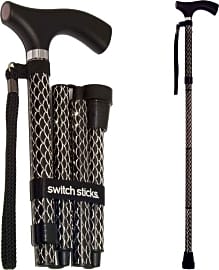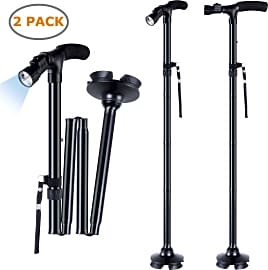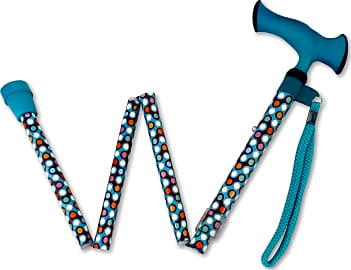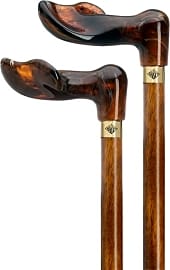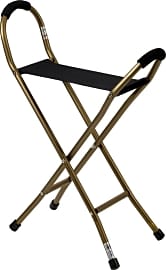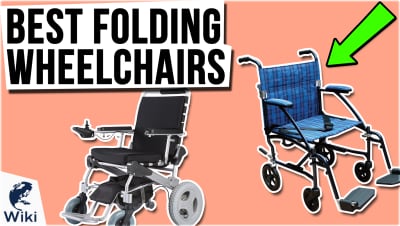The 10 Best Walking Canes

This wiki has been updated 38 times since it was first published in September of 2015. One look at our comprehensive selection of walking canes will show you how far these aids have come as both medical equipment and fashion accessories. You can get one to help with many mobility issues and to complement almost any style, from subdued to eye-catching. Most are even inexpensive enough to let you get a couple, whether for various uses or just to have options. When users buy our independently chosen editorial choices, we may earn commissions to help fund the Wiki.
Editor's Notes
February 21, 2020:
Before choosing a walking cane, it's a good idea to speak to a healthcare professional, to both ensure you're selecting an appropriate model and to train in the proper use. Using a walking cane improperly can actually create a fall risk, so it's important to take the time to learn how to use one the right way.
For its simplicity, usefulness, and wide range of colors, the Nova Medical Products Designer remains an option that's hard to top, but we've removed the relatively similar Vive Folding over occasional issues with it collapsing. We've added the popular Campbell Posture, instead. It can keep users from hunching and watching the ground as they walk, leading to a more efficient mobility experience. It does so by way of its handle, which is not shaped like most traditional models. Most find that this is comfortable to hold, but it doesn't fit all hands equally well — something that's true of many models, in fact. This includes the Harvy Unisex Palm Grip and its shaped grip that's offered in versions for righties and lefties. For something simpler, consider the Carex Traditional. It can't take as much abuse as a metal version, but it's exceedingly simple and budget-friendly. It stands 36 inches tall and can be adjusted by cutting the wood down to a smaller size. That means you can't make it taller, unfortunately.
Finally, after some consideration, we've opted to keep the Drive Medical Sling Seat. It's a little bulky and heavy, but for those who have relatively good mobility, but who need to rest occasionally, it can be a workable alternative to a traditional walker with a seat.
Special Honors
Scully and Scully Golden Handled Italian Just one glance should tell you that the Scully and Scully Golden Handled Italian is no boring medical device. With its smooth black wood and textured gold top, it is sure to turn heads. These aren't adjustable, however, and there aren't too many sizes to choose from. scullyandscully.com
Elderluxe Crook When nothing but the ultimate in luxury will do, the Elderluxe Crook is sure to fit the bill. You could buy a high-end laptop for the cost, but this eye-catching model is encrusted with Swarovski Elements crystals, making it an excellent choice for making a statement. elderluxe.com
Canes Galore 14-Karat Because its handle is made of solid gold, the Canes Galore 14-Karat is, as you might imagine, quite expensive. It stands 36 inches tall, but for a fee, its sleek ebony wood shaft can be cut down to accommodate users who are on the shorter side. canesgalore.com
How Do I Choose a Proper Cane For Me?
Fortunately, a lot of modern canes are adjustable, with the majority of models being made out of either lightweight metal or aluminum alloy.
Height is usually the first priority when it comes to choosing a cane. Choosing a cane that stands too high can impact your gait. Choosing a cane that stands too low can cause you chronic back pain or muscle strain. The best way to gauge your proper cane height is by standing upright with both arms at your sides while wearing a pair of walking shoes. Measure the distance from the ground up to your wrist on whatever side the cane will reside. That measurement represents your ideal cane height.
Fortunately, a lot of modern canes are adjustable, with the majority of models being made out of either lightweight metal or aluminum alloy. Most of today's canes weigh somewhere between 10 oz and 1.5 lbs, although elaborate models may weigh considerably more. Wooden canes are still on the market, but they are less popular due to a lack of flexibility and available features. It's rare to find a wooden cane that's adjustable, let alone a wooden model that can accommodate a three- or four-point base.
If you walk at night, you may want to pursue a cane that comes with a flashlight for enhanced vision and visibility. If you suffer from any type of hand condition, you may want to pursue a cane with a rubberized grip and a padded base for added shock absorption. If you experience pain across both hips, it may be worth upgrading to a walker, which can alleviate the burden on your lower body. If you have a physician, it may be worth consulting him or her before moving forward with your final choice.
Why Buy a Walking Cane Now (As Opposed to Later)
A lot of people don't consider the use of a walking cane until they are essentially forced into doing so. This is ironic in that a cane can actually be more beneficial when enlisted as a preventative measure to minimize the lingering effects of a complicated injury or a condition.
The point being that the use of a cane should be considered more of a strength than a weakness - a proactive, rather than a reactive, way to go.
Consider the early stages of arthritis, or a diminishing level of cartilage in one knee. Chances are a person will feel the slow-grinding effects of both conditions long before they graduate onto a point where the pain either sidelines that person, or requires some type of surgery. Early detection combined with the use of a cane might allow for other forms of treatment, along with the ability to continue exercising without placing one's body at risk.
Daily exercise is essential to promoting respiratory and cardiovascular health. More importantly, any type of ongoing joint problem has the potential to impact your balance and your posture, which may, in turn, result in chronic back pain, neck pain, or worse. The point being that the use of a cane should be considered more of a strength than a weakness - a proactive, rather than a reactive, way to go.
Using a cane on a regular basis helps your body redistribute its weight, reducing the amount of stress placed on aching muscles, while also minimizing the pressure felt across your back. In the long run, using a cane will help you maintain an appropriate fitness regimen, and it may also enable you to walk short distances, or attend social functions, without the use of any walking aid at all.
A Brief History of The Walking Stick
In the early days of civilization, a walking stick was used as much for support as it was for protection. Shepherds, nomads, and early laborers would carry handmade sticks for stability along steep hills and rugged terrain. They would also carry these sticks for safeguard against wild animals and would-be thieves.
Today's canes can be customized, with certain models being advanced to an extent they can accommodate a lot more patients' needs.
In Ancient Egypt, the walking stick matured into a symbol of prestige. Kings and noblemen would carry scepters that stood six feet tall, the height being a reflection of their stature. This tradition soon spread to the nobility of Ancient Greece, Rome, and China. Walking sticks became shorter and more utilitarian among the ruling class, whereas they remained tall and increasingly ornate among the pious.
The term cane emerged during the 16th century as a result of walking sticks being made out of bamboo, tropical grass, and several other types of reeds, or "canes." The more common these canes became, the more the British aristocracy began to carry them as a reflection of fine breeding. Carrying a cane on one's right was considered an indication of wealth; carrying a cane on one's left was considered an indication of virtue.
During the 1800s, oak canes became popular among American legislators and other men of high station. In select jurisdictions, citizens were required to apply for a license before they could carry a cane, as the cane wielded a potential to be used as a weapon. American women began to use canes during this period, as well, particularly during long walks, or whenever running errands.
The use of canes for mobility has increased dramatically over the past 100 years. Military veterans, in particular, are prone to walking with canes as a result of lingering injuries, or other battle-related conditions. Today's canes can be customized, with certain models being advanced to an extent they can accommodate a lot more patients' needs. Whereas modern canes are rarely used to make a fashion statement, they are very commonly used for day-to-day support.





